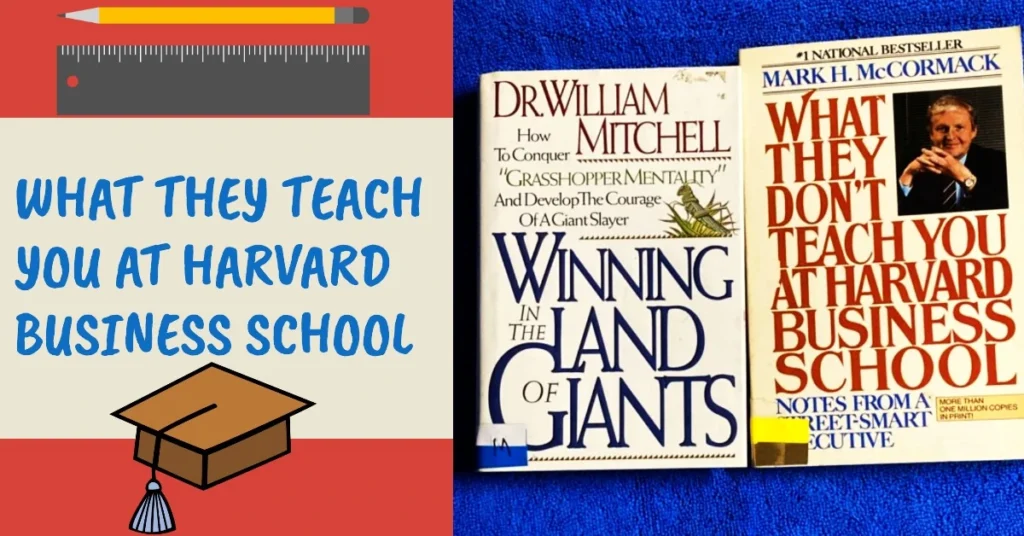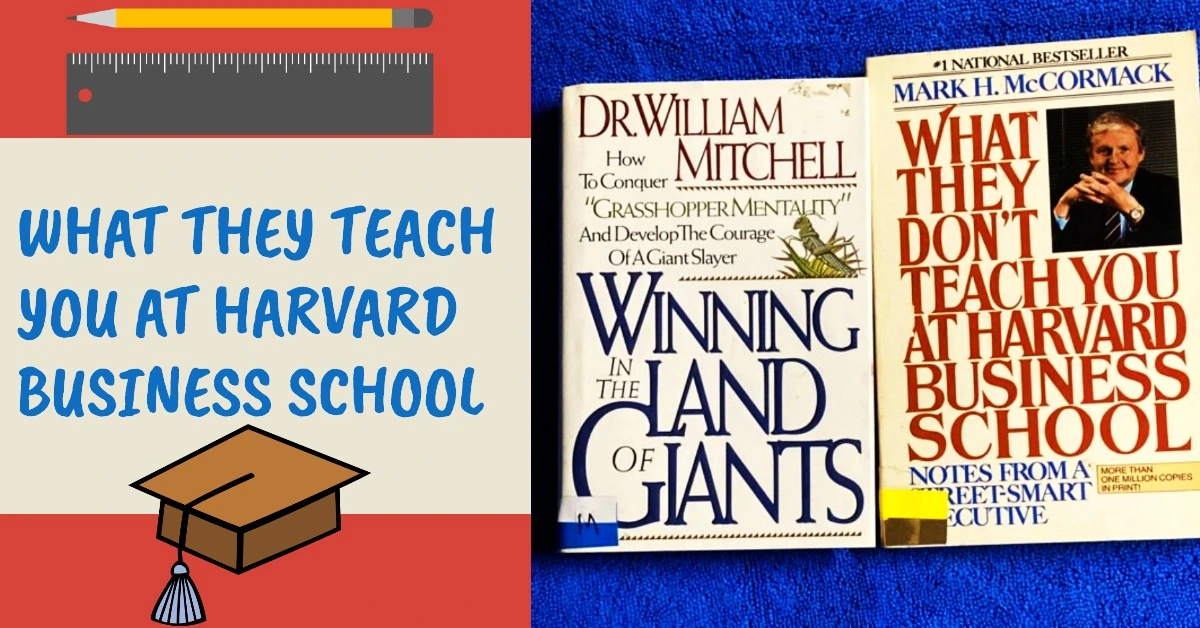In the realm of elite education, Harvard Business School (HBS) reigns supreme, celebrated for its transformative curriculum and the life-altering lessons encapsulated in “What They Teach You at Harvard Business School.” This iconic institution is not just a school but a launching pad for unparalleled success and global influence.
For over a century, Harvard Business School (HBS) has maintained unrivaled prestige as the world’s top business school. With an extremely selective admission rate of under 12%, HBS accepts only the most accomplished applicants. This recognizes the school’s eminent faculty, innovative curriculum, and caliber of students. An HBS degree opens doors to virtually any business career.
But what exactly does the HBS experience entail? What can students expect to learn during their two years in Boston? This comprehensive guide will highlight the key pillars underlying HBS’s excellence.
What is Harvard Business School?
Established in 1908, Harvard Business School pioneered the case study method. An approach often emphasized by Philip Delves in his teachings and was the first business school to offer a master’s program. HBS offers a two-year, full-time MBA program, doctoral programs, and executive education.

Over 10,000 professionals apply to HBS annually, with less than 1,000 admitted annually. HBS students represent over 60 countries and a multitude of backgrounds and interests.
The school’s main campus is located in Boston, Massachusetts, not far from the financial hustle of Wall Street. HBS has a faculty of 200+ professors, including notable names like Delves Broughton, and an extensive global alumni network, reminiscent of the broad connections maintained by Philip Delves Broughton.
Why is Harvard Business School so Prestigious?
As the oldest business school in the United States, HBS has cultivated exceptional prestige over the past century. Factors underlying its reputation include:
- World-renowned faculty shaping business management practices
- Innovative academic approaches like the case study method
- Highly selective admissions attracting top-tier students
- Powerful alumni network providing unmatched career opportunities
- Cutting-edge business research produces insights that influence industries
- Pioneering business leaders among its alumni and faculty
In short, HBS sets the gold standard for business education based on its history, faculty, students, curriculum, and graduate outcomes.
What Can You Expect to Learn at Harvard Business School?
During their two years at Harvard, students gain cross-disciplinary business knowledge, leadership capabilities, and access to an invaluable network. Specifically, students can expect to learn:
- Core business skills in finance, accounting, marketing, operations
- Strategic thinking and analytical problem-solving
- Navigating ambiguity and managing complexity
- Innovation in emerging fields like AI and machine learning
- Effective communication, persuasion, and collaboration
- Ethical leadership and management principles
- Entrepreneurship and business model development
- Building professional networks and partnerships
An HBS education offers integrated expertise in both traditional and modern business practices. Similarly, narratives about two years inside the cauldron highlight the intense learning environment. This experience is often likened to being inside the cauldron of capitalism.
The Renowned HBS Case Study Method
The case study approach lies at the heart of learning at HBS. Rather than lectures, students apply concepts to real-world scenarios.
Case Study Learning vs. Traditional Lectures
| Aspect | Case Studies | Traditional Lectures |
|---|---|---|
| Learning Approach | Application to real situations | Theoretical knowledge |
| Student Engagement | Active engagement | Passive listening |
| Skills Developed | Critical thinking and analysis | Note-taking |
| Assessment Style | Persuasion and decision-making | Exam-based testing |
| Knowledge Integration | Multidisciplinary integration | Siloed disciplines |
Through 500+ case discussions, students develop strategic intuition and leadership capabilities vital in today’s complex business environment. The diversity of cases pushes students outside their comfort zones, enhancing adaptable problem-solving skills.
How Case Studies Build Key Skills
HBS case studies help students develop vital capabilities:
- Critical Thinking: Assessing complex situations to identify key issues and develop solutions.
- Analysis: Interpreting quantitative and qualitative data to inform decisions.
- Persuasion: Using data, logic, and influencing skills to gain support for conclusions.
- Decision Making: Weighing tradeoffs and risks to select and justify a path forward.
- Cross-Disciplinary Application: Synthesizing concepts from diverse subjects to address real challenges.
No other MBA curriculum allows applying knowledge to real-world situations so tangibly. Through case studies, students gain strategic intuition and leadership abilities valued in any field.
Access to Visionary Business Leaders
The HBS faculty, including notables like McCormack, features pioneering thinkers shaping business theory and practice. Guest speakers, akin to experiences in Philip Delves Broughton’s journey, enrich learning, taking students from the first class to graduation, just as years at Harvard take us through transformative education.
World-Renowned Faculty
HBS professors have included business thought leaders like:
- Michael Porter: Father of modern business strategy; 5 Forces, Generic Strategies
- Clayton Christensen: Expert on innovation and “disruptive innovation”
- Rosabeth Moss Kanter: Acclaimed management scientist focusing on strategy and organizational change
This star-studded faculty, echoing the wisdom and folly Mark McCormack found, delivers insights turning two years at Harvard into a business classic journey.
Visits from Business Luminaries
Through speaker series and events, students gain wisdom from icons like:
- Sheryl Sandberg: Facebook COO and author of feminist manifesto Lean In
- Reid Hoffman: Founding CEO of LinkedIn, influential investor and entrepreneur
- Bill Gates: Microsoft founder and philanthropist
Interacting with these exemplars gives students an inside look at success and fuels their own career visions.
Cutting-Edge Business Curriculum
To succeed in business, students must command core disciplines while adeptly applying the latest tools. The HBS curriculum balances foundational business education with emerging techniques and electives.

Core Courses:
HBS’s curriculum, known for churning out business leaders, is a treasure trove of knowledge. The first year, akin to two years inside the cauldron, is intense, with courses including:
- Financial Accounting: The backbone of capitalism, understanding assets, liabilities, and equity.
- Finance: From Wall Street to startups, mastering the art of money management.
- Marketing: Beyond advertising, a journey into consumer minds.
- Strategy: Not just for CEOs, strategic thinking is for everyone.
- Operations: The unsung hero of the business world, ensuring everything runs smoothly.
Elective Courses:
In their quest for an MBA from Harvard Business School, students choose electives that resonate with their career aspirations, diving into subjects like:
- Entrepreneurship and Venture Capital: For the risk-takers and deal-makers, the heart of Silicon Valley.
- Leadership and Communications: Essential for the high-flyers and future CEOs.
- Negotiations: The art of the deal, a must-know in any field.
- Global Business: Because today’s business is borderless.
This curriculum, a blend of business classics and modern innovation, is a gateway to becoming the kind of person who shapes industries and changes the world.
Case Studies: An Inside Look
Case studies test students’ ability to apply concepts to real problems quickly. This talent is invaluable in dynamic business environments.
What Are Case Studies?
Case studies present multifaceted real-world business challenges for analysis and strategy development. Unlike theoretical textbook scenarios, cases are immersive dives into actual companies, products, and dilemmas.
Why Are They Important at HBS?
Case studies form the core of learning at HBS. Discussing 500+ diverse cases over 2 years sharpens skills like:
- Analytical thinking
- Leading teams through ambiguity
- Persuasion and communication
- Strategic decision making
- Integrating insights across subjects
How to Succeed at Case Studies
Excelling at case analysis requires:
- Meticulous data analysis
- Weighing qualitative and quantitative factors
- Crafting sound yet creative solutions
- Communicating recommendations persuasively
- Justifying conclusions with logic and proof points
Through case mastery, HBS students gain strategic intuition that guides business decisions large and small.
The Unparalleled HBS Campus Experience
Between classes, HBS offers a tight-knit culture facilitating meaningful interactions, much like the community depicted in the thrilling and hilarious memoir of student life.
- Collaborative Environment: The HBS classroom experience, a journey that takes us from the first class, revolves around discussion rather than lecture, fostering an entrepreneurial spirit. Past experiences matter less than collaborative abilities, a concept well-articulated in the memoir of his two years at HBS.
- State-of-the-Art Facilities: Cutting-edge classrooms, technology, and study spaces, akin to the world’s biggest and most influential banks. Optimize learning and sharing, pushing students ahead of the curve.
- Co-Curricular Activities: Some 700+ student clubs cater to interests from healthcare to wine, embodying the wisdom and folly he found. Conferences, competitions, and guest lectures offer networking and leadership opportunities, providing insights you have always wanted to know.
- Global Diversity: With students from 60+ countries, HBS allows engaging peers from vastly diverse viewpoints. An aspect highlighted in every great book about the MBA at Harvard Business School experience.
This enriching environment breeds innovation, teamwork, and friendship. According to students, it is as transformative culturally as academically, a sentiment echoed by those who have always wanted to know how to thrive in such a vibrant setting.

Frequently Asked Questions – FAQs
You will gain comprehensive business acumen, leadership strategies, and practical entrepreneurship skills at HBS.
Absolutely, HBS excels in offering transformative executive courses that fortify professional expertise and strategic vision.
Numerous books, including “Ahead of the Curve” by Philip Delves Broughton, reveal insights into HBS’s transformative curriculum.
The MBA program at HBS fosters critical thinking, innovation in business practices, and effective leadership methodologies.
HBS focuses on core areas like strategic decision-making, financial acumen, and entrepreneurial leadership in global business landscapes.
Attending HBS offers unparalleled networking opportunities, access to thought leaders, and a pathway to high-impact entrepreneurial endeavors.
HBS’s MBA program is a comprehensive, case-study-based education that fosters entrepreneurial thinking and global business leadership.
Wrapping Up
As this guide demonstrates, Harvard Business School offers an unrivaled MBA program, blending academic rigor with real-world application. It’s a transformative journey, much like the hilarious memoir of his two years that Philip Broughton penned, capturing the essence of learning where entrepreneurs succeed.
HBS shapes leaders for global impact in companies and countries, instilling a moral compass, practical strategies, and time management skills. The curriculum, a blend of theory and business concepts, reflects lessons from book reviews and paperbacks found in any bookshop, offering insights you’ve always wanted.
The experience, as iconic alumni note, changes lives, teaching handshake deals and apprentice-style tasks. It’s a world where prime members of the international management group thrive, and every class takes us from the first step to mastery, just as two years at Harvard takes one through a transformative journey.
Muhammad Asif Saeed has extensive experience in commerce and finance. Specifically, He holds a Bachelor of Commerce degree specializing in Accounts and Finance and an MBA focusing on Marketing. These qualifications underpin his understanding of business dynamics and financial strategies.
With an impressive 20-year career in Pakistan’s textile sector, including roles at Masood Textile (MTM) and Sadaqat Limited, excelling in business & financial management. His expertise in financial and business management is further evidenced by his authoritative articles on complex finance and business operation topics for various renowned websites including businessproplanner.com,businesprotips.com,distinctionbetween.com, trueqube.com, and bruitly.com, demonstrating his comprehensive knowledge and professional expertise in the field.


nice content!nice history!! boba 😀
wow, amazing
Thanks
🧠 This post is a workout for the brain! 🧠